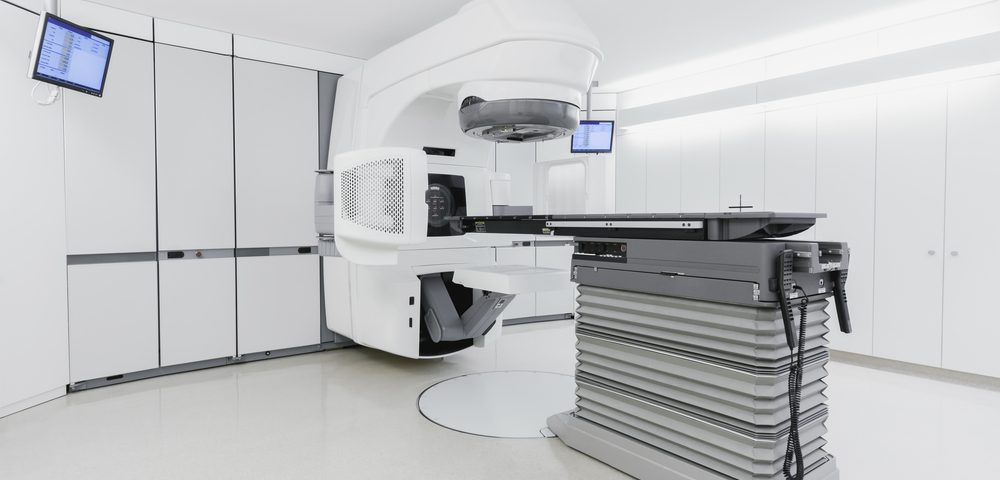Women with early, low-risk hormone receptor-positive breast cancer are significantly less likely to see their disease return if given radiation therapy and hormone therapy following surgery, according to a trial that followed hundreds of women for nearly 10 years.
Specifically, the trial found that whole breast irradiation plus hormone therapy after breast-conserving surgery (lumpectomy) was better at controlling a tumor locally and preventing a recurrence in the same breast, compared with hormone therapy alone.
The findings were revealed at ESTRO 38, the annual congress of the European Society for Radiotherapy & Oncology, held April 26–30 in Italy, in a presentation titled “Antihormones with or without irradiation in breast cancer: 10-year results of the ABCSG 8A trial.”
To investigate the long-term effects of combining radiotherapy with hormone therapies as an adjunctive treatment given shorty after surgery, the researchers examined the responses of 869 postmenopausal women who were followed for nearly 10 years in the 8A trial of the Austrian Breast and Colorectal Cancer Study Group (ABCSG).
All women had hormone receptor-positive cancers. In other words, their tumors were driven by estrogen or progesterone, and would respond to hormone therapies such as tamoxifen or anastrozole.
Their tumors were early-stage and low-risk, as they were classified grade 1 or 2, were smaller than three centimeters, and tested negative for spread to the lymph nodes. No women had received previous chemotherapy, radiotherapy, or hormone therapy.
Patients were randomly assigned to receive either whole breast irradiation plus hormone therapy (439 women), or hormone therapy alone (430 women), after they had undergone breast-conserving surgery.
After a median follow-up of 9.89 years, 10 women among those treated with radiation saw their cancer return in the same breast, compared with 31 women among those given hormone therapy alone.
This translated in 10-year local control rates of 97.5% after radiotherapy versus 92.4% without radiotherapy.
Accordingly, there was a significant impact on how long women survived without their cancer returning — 94.5% of the women who had radiation therapy were disease-free at the end of the follow-up, compared with 88.4% among those who received only anti-hormonal treatment.
A similar benefit was seen if looking solely at women who had their sentinel nodes removed, as they had a 75% lower risk of disease recurring if they were treated with radiation.
Sentinel nodes are the first lymph nodes into which tumor cells are most likely to drain. If no tumor cells were found in them, then no other lymph nodes were removed during surgery. However, if cancer had spread to the sentinel nodes under the arm, both sentinel and axillary lymph nodes would be dissected. In this latter group of women, however, radiation therapy brought no significant advantage to disease-free survival.
Overall survival and survival without cancer spreading elsewhere (metastases) was also similar between women who did or did not have radiation therapy.
A posterior analysis of tissue from 519 of the patients looked at the levels of a protein called Ki-67 — a marker of cell proliferation — and HER2 — a promoter of cell growth overexpressed by some breast cancers.
Patients who had high-risk tumors, with high levels of Ki-67 (above 20%) or positive for HER2, or both, were not at higher risk of cancer return in the same breast, although there was a clear trend towards it. However, this finding requires further research with more women and with a longer follow-up, the researchers said.
“In this trial, the omission of [whole-breast irradiation] and tumor grading Gx, respectively, turned out to be the only negative predictors for [in-breast recurrence],” the researchers wrote.
The benefits of post-surgery radiotherapy have been confirmed in hormone receptor-positive patients “regardless of whether or not they are at high risk of breast cancer recurrence,” Gerd Fastner, MD, professor at Paracelsus Medical University and University Hospital Salzburg, in Austria, and lead author of the study, told the conference, according to a press release.
“Improving control of the tumour at the primary site may translate into better survival in future years,” he said.
Added Umberto Ricardi, MD, president of ESTRO and head of the oncology department at the University of Turin, Italy: “This is important information for women and their doctors, which helps them to choose the best treatment for their breast cancer.”
He said that radiation treatments have progressed significantly and now there are alternatives to whole breast irradiation that are less toxic and time-consuming.
Fastner put forward some of these alternatives for partial breast irradiation: postoperative hypofractionated external beam radiotherapy, intraoperative techniques, or perioperative brachytherapy.
He warned that “total omission of radiotherapy should only be considered in frail, elderly patients who would not be able to tolerate such treatment.”

